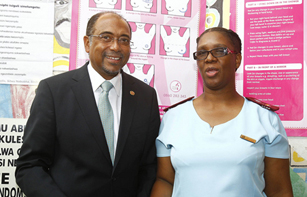
Feature Story
KwaZulu Natal adopts a holistic approach to HIV
30 September 2011
30 September 2011 30 September 2011
Mr. Sidibé visited the Halley Stott Primary Health Clinic in Botha’s Hill where Sister S.B. Shawuka, the Operational Nursing Manager of the clinic show him how integrated health services are serving the needs of the local community.
Credit: UNAIDS/A.Debiky
The Province of Kwazulu Natal, South Africa, has been widely acknowledged as leading the provincial response to HIV in the country. Its integrated approach to service delivery means that people who are accessing services are those who need them the most.
Part of this integrated approach is the innovative Operation Sukuma Sakhe (Let us stand and build), where data is collected on the health, social and economic needs of households in the local community.
The data is collected by a War Room Task Team, comprised of community volunteers called cadres, who ‘profile’ households in order to assess their needs. This data is then taken to a ‘War Room’ at the clinic where a committee meets to discuss and process the data they have gathered on households before referring to the appropriate government department to deliver the services needed to the households.
“The district has more than 60 volunteer cadres, which is quite a lot for the size of the district. I do this job because of the thrill I get from knowing that I am helping people with their problems”, says Vukani Ndlovu, the war room task team supervisor.
It is this unique approach to the integration of services which drew UNAIDS’ Executive Director, Mr. Michel Sidibé, to meet with policymakers, implementers and community members in KwaZulu Natal Province on the second day of his official visit to South Africa.
The province is showing a major commitment to HIV prevention by pushing a holistic approach to health services
UNAIDS Executive Director Michel Sidibé
Mr. Sidibé visited the Halley Stott Primary Health Clinic in Botha’s Hill, located in the strikingly beautiful Valley of a Thousand Hills area just outside Durban. At the clinic, Mr. Sidibé was shown how integrated health services are serving the needs of the local community.
“We offer a range of services at the clinic, from HIV prevention, counselling, testing and treatment, preventing mother-to-child transmission of HIV to TB, paediatric care, cervical and breast cancer screening and even psychiatry and dentistry,” explained Sister S.B. Shawuka, the Operational Nursing Manager of the clinic.
The clinic also does regular community outreach through its mobile clinics, offering HIV testing and counselling, immunisations, cancer screening and raising awareness on the health services offered. They recently conducted a community outreach campaign in partnership with a local NGO to teach women how to do monthly checks for breast cancer.
“The province is showing a major commitment to HIV prevention by pushing a holistic approach to health services,” said Mr Sidibé. “I am heartened to see how KwaZulu Natal is leading innovation with a successful model which I hope other Provinces will replicate.”



